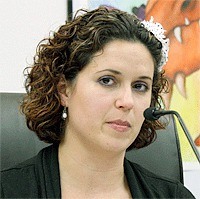Members of the Oak Harbor City Council decided to suspend their own rules to allow Councilwoman Tara Hizon to participate in the next meeting over the phone from another state.
The council members touted the temporary rule change as a move toward modernity, but the issue isn’t without concerns over open and transparent governance.
Hizon announced at the city council meeting last week that she will be in the Appalachian Mountains during the July 3 council meeting. She asked her fellow council members to suspend a council policy that states council members must be present at meetings to participate so she can, in essence, phone it in.
The other council members voiced support for the idea, though Joel Servatius said he had some concerns about possible glitches. In fact, the members indicated that the rule should be permanently amended to allow remote and electronic participation of elected officials.
“It’s about time we come out of the Stone Age,” Councilman Rick Almberg said.
“It only makes sense that we try to accommodate decision makers electronically,” he added.
While none of the council members considered open government issues aloud, interim City Attorney Grant Weed broached the subject. He said the state’s Open Public Meetings Act doesn’t address teleconferencing, probably because it was adopted back in 1971. He said the Supreme Court hasn’t ruled on the issue.
Weed pointed out that the Municipal Research and Service Center has published an opinion that it’s probably OK.
Attorney Greg Overstreet, an expert in open government laws, said he likely wouldn’t have concerns about elected officials participating over the phone or other technology as long as it occurs “as a very occasional exception.”
“The people need to be able to see their elected officials,” he said. “They need to be able to see body language and watch people speak. There’s more to a meeting than just the audio.”
In addition, people could worry that an elected official is receiving input from someone during the meeting that nobody can see.
Overstreet agrees that there’s little guidance in statutes or case law, but he understands that emergencies may occur.
“If this became a regular practice, we would have an OPMA problem,” he said.
Likewise, Tim Ford, the attorney general’s ombudsman on open government, looked into the issue and concluded that a governing body may “attend” a meeting through teleconference as long as it’s in compliance with other requirements of the act.
“While it may be good policy to require such physical attendance, the OPMA must be construed broadly to fulfill its purpose,” he wrote.
In an interview, Hizon said she would prefer to “attend” the meeting through Skype so people could see her, but it isn’t possible where she will be. She said she’s excited to be the guinea pig for the council’s first foray into teleconferencing. She will be speaking through a speakerphone that will be set at a microphone.
Hizon said she understands there may be concerns, but she feels it’s preferable to having elected officials absent from meetings. She said she’s in favor of permanently changing the rule so that teleconferencing is allowed, but she agrees there should be limits on the practice.
Hizon said city staff members are currently working on updating the council’s policies based on recommendations from an expert in parliamentary procedures. The teleconference change may be wrapped into the amendments.



